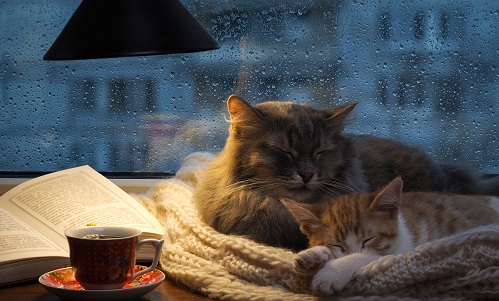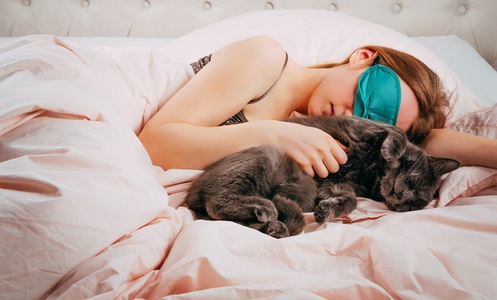So you may be wondering, are cats nocturnal? Our experts can help. Read on for useful information, including helpful insight and definitions, as well as tips and guidelines for managing this behavior.
Understanding Feline Behavior: Are House Cats Nocturnal?
Although most people would simply think of cats as nocturnal animals, it isn’t exactly accurate. In fact, domestic house cats are considered both nocturnal and crepuscular, a biological category describing animals whose primary hours of activity take place at dusk and dawn. This instinctive behavior is part of a feline’s evolution: just like his wild brethren in the jungle, domestic cats are designed by nature to take advantage of their environment when things are cool and dark. For house cats, this also entails sleeping during the day and conserving their energy for heightened nighttime activity, mimicking his ancestor’s hunting at dusk. In other words, not unlike his African wildcat ancestors, the modern-day domestic cat is hard-wired to be active at night. Below, a closer look at the two primary biological categories to better understand the different sleeping patterns of creatures within the animal kingdom – and where felines fit in:
It’s 4am and suddenly there’s a crash in the living room – an all-too-familiar scenario for house cat lovers everywhere. The family feline is on the prowl, slinking around the home (and likely making plenty of noise along the way). Maybe he’s got a fuzzy partner in crime to get into some domestic mischief – after all, what’s the point of decorations on the shelf if not to knock them off onto the floor? No matter the situation, one thing’s for certain: everyone’s awake in the household, and it probably won’t be the last time.
Diurnal
By definition, ‘diurnal’ refers to many different classes of animals, but they all share one major trait in common: they’re active during the day and rest (or have periods of inactivity) at night. Some of the most commonly-recognized diurnal animals include mammals, reptiles, and birds. Additionally, most primates are diurnal. There are numerous biological reasons why an animal may be diurnal – for example, to avoid nighttime predators. On the other hand, some animals were designed to be diurnal in order to hunt during the daylight hours, thus increasing their odds of survival. Furthermore, certain animals such as turtles require daytime activity; this is because they require sunlight in order to synthesize vitamin D3 in their bodies.
A few major examples of diurnal animals include:
- Bearded dragons
- Butterflies
- Canines
- Chimpanzees
- Chimpanzees
- Cobras
- Deer
- Dolphins
- Elephants
- Gibbons
- Gorillas
- Hawks
- Honey bees
- Humans
- Komodo dragons
- Lizards
- Monkeys
- Orangutans
- Ostriches
- Squirrels
- Turtles
- White starlings
Nocturnal

The opposite of diurnal, nocturnal animals are active during the night and sleep during the daylight hours. However, in order to adapt to the darkness, evolution has played a part in nocturnal creatures’ development – most nocturnal animals possess highly-evolved senses, including smell, hearing, and most notably, eyesight. In fact, certain animals – such as ferrets and cats – have eyes that are able to adapt to both high and low levels of illumination. Furthermore, felines also feature slit-shaped retinas, providing them with superior night vision. This heightened sight also makes it easy for felines in the wild to ambush their predators – and for domestic cats to tackle their unsuspecting owner’s feet during a 3am trip to the bathroom. Due to the unique shape of their retinas, felines are capable of lying in wait for hours in the dark in anticipation of prey. Similarly, domestic cats’ behavior hearkens the same predatory instincts: ask any pet parent and they’re sure to have at least a few stories of their rambunctious kitty stalking the shadows in the middle of the night (or just before their alarm clock goes off).
Just as diurnal animals evolved out of necessity, nocturnal animals’ sleep habits serve them for a variety of reasons. Depending on their role in the wild, they may fare better at night to elude daytime predators. In other instances, some nocturnal animals may be predisposed to activity at night because they’re natural hunters and stalk their prey at dusk.
A few primary examples of nocturnal animals include:
- Bats
- Black rats
- Catfish
- Cockroaches
- Cougars
- Coyotes
- Crickets
- Fireflies
- Gerbils
- Hyenas
- Jaguars
- Kangaroos
- Koalas
- Leopards
- Lions
- Mice
- Owls
- Porcupines
- Possums
- Scorpions
- Skunks
- Tarantulas
As illustrated above in these two primary categories, when it comes to an animal’s sleep cycles and circadian rhythms, their behaviors are determined primarily by evolution – and where an animal falls within the food chain. While domestic house cats are primarily recognized as nocturnal, they do display many crepuscular behaviors – that is, they are most active during the peak hours of dawn and dusk.
Are All Cats Nocturnal?

It’s clear that domestic house cats have taken a genetic cue from their wild cousins in the jungle – that is, their biological proclivities to be more active at night and take ample cat-naps during the day. However, even though the average housecat sleeps between 16-20 hours per day, it doesn’t necessarily mean he’ll always be a night owl – he may alternate between sleeping some nights and bouncing around the house on other occasions. And while most felines tend to be active overnight, sleep patterns vary between cats.
For example, a housecat may go to bed with his person and stay in the room til 5am, sleeping undisturbed alongside his owner. Depending on his age, health, dietary habits, behavioral traits, and even personality, some kitties are hyper at night, while others may be good sleepers. For a few lucky folks, there are cats who are pretty even-keeled when it comes to sleep habits (and not creating a commotion at night). For the less fortunate set, read on for helpful tips.
Help – My Cat Keeps Me Up Constantly!
In the instance that the family cat is creating nocturnal chaos on a fairly regular basis, fear not: there are a few different tactics a cat owner can implement to ensure a decent night’s sleep – for both kitties and their families. Although he may be on his own schedule, cat folks can still get their zzz’s by following a few simple tricks. Below, several vet-recommended guidelines for sleep-deprived pet parents:
Schedule regular playtime: Similar to young children, a spirited playtime with the family house cat will usually ensure he’s tuckered out at the end of the day. Just as people are tired after a vigorous bout of exercise, cats will likely sleep a lot more soundly after engaging in a game of fetch and other activities with their fur parents. Find toys and puzzles that he likes, and make sure to leave them out for when he’s home alone and bored. Bonus: providing him with quality cat toys and scratching posts can also save your furniture!
Experts recommend daily playtime with cats for at least a half hour in the early evening, preferably before his supper. Combine the exercise with a good meal, and don’t be surprised if he voluntarily takes a cat nap soon after! In addition to spending quality bonding time with him, routine playtime offers both a healthy (and necessary) form of activity to keep him alert and in shape, while helping promote a good night’s sleep for everyone.
Helpful Tip: Some experts recommend food-dispensing cat toys, which offer both physical and mental stimulation. Feeder toys are not only a great form of daytime exercise when he’s home alone, but satisfy his hunter/predatory instincts!
Don’t cave in to midnight feedings: Most pet owners will attest: it’s hard to refrain from spoiling their fur babies! However, giving in to his midnight mews for Fancy Feast will only encourage him to disturb your slumber for late-night snacks in the future. The solution? Don’t succumb to begging. Instead, try to regulate his meal-times and feed him before you go to bed – some domestic cat experts even suggest leaving him a good-sized portion in his bowl to prevent 3am cries for kibble. Typically, cats will graze throughout the night. In other cases, some kitties may eat their meal all in one sitting, and (if you’re lucky) find themselves ready for sleep once they’re full.
A room with a view: Another pro tip: leave curtains or blinds open in the living room (or anywhere else outside of the bedroom). Depending on where the kitty spends the majority of his time at night, a room with a view can provide him with some light entertainment while his parents are in dreamland – just make sure the window itself is closed!
Do not disturb: Although many fur baby folks prefer to have their kitty purring next to them in bed, it may be a recipe for disaster if your feline friend doesn’t sleep through the night. Leaving the bedroom door open only encourages him to come and go as he pleases – inviting him to stalk your feet at the crack of dawn or pounce on your face when he decides he’s hungry. Although this habit is best groomed at an early age (since it’s hard to break once they’re used to it), avoid letting the cat into the bedroom. Instead, provide him with his own cozy sleeping quarters – either a crate lined with his favorite toys and blankets, or a fluffy cat bed. With a variety of cat beds on the market, there’s a style for felines at every stage of life. There are even felt cat caves available that offer a safe hiding place for him to chill out in when he’s stressed or anxious.

Behavior modification is key: While humans can’t change their cat’s instinctive behavior, they can refrain from rewarding him for undesirable behavior. For example, many pet parents may actually be reinforcing a cat’s nighttime antics without even realizing it. By getting up to pet him, feed him, or even chase him down the hallway, it merely reinforces to him that disturbing you gets attention. Although it may be difficult at first, try to ignore his behavior whenever possible. Managing his environment is the most proactive step pet parents can make – for example, if he’s hopping into bed and waking you up, keep the door closed at night. If your feline friend tends to be particularly rambunctious, white noise machines or simply leaving a fan on in the bedroom can also help restless parents get a good night’s sleep.
Helpful Tip: While first-time cat owners may be frustrated at being disturbed by their frisky feline, it’s important to understand that he is merely acting on instinct. Rambunctious nighttime activity is natural for cats, and should not be mistaken as acting out or being spiteful. Therefore, never punish a cat. Instead, redirect his behavior whenever possible and observe his routine, then modify his environment accordingly.
By understanding a cat’s sleep patterns, nocturnal/crepuscular behavior, and hunting instincts, pet parents can learn how to foster a better relationship with their fur baby. Although every cat varies, one thing is for certain – they are creatures of the night, and save their energy for when the sun goes down. Once owners learn how to manage their cat’s environment effectively, a symbiotic relationship can exist where cats and their humans are both in sync.
Are you in need of CBD for pets? Canna-pet is proud to offer CBD for cats and dogs! Be sure to check out our full product line.
Sources Cited:
- “Are House Cats Nocturnal.” LeadER (leadervet.com), March 11, 2018, http://www.leadervet.com/media/are-house-cats-nocturnal. Accessed November 18, 2020.
- Smith, Casey. “Cats Domesticated Themselves, Ancient DNA Shows.” National Geographic (nationgeographic.com), June 19, 2017, https://www.nationalgeographic.com/news/2017/06/domesticated-cats-dna-genetics-pets-science/. Accessed November 18, 2020.
- “Classification of Animals: The Complete Guide.” AZ Animals (a-z-animals.com), (no published date), https://a-z-animals.com/reference/animal-classification/. Accessed November 18, 2020.
- “Nocturnality.” Wikipedia (en.wikipedia.org), (no published date), https://en.wikipedia.org/wiki/Nocturnality. Accessed November 18, 2020.
- “Diurnality.” Wikipedia (en.wikipedia.org), (no published date), https://en.wikipedia.org/wiki/Diurnality. Accessed November 18, 2020.
- “Are Cats Nocturnal?” Healthypaws Pet Insurance & Foundation (healthpawspetinsurance.com), December 23, 2019, https://www.healthypawspetinsurance.com/blog/2019/12/23/are-cats-nocturnal. Accessed November 18, 2020.
- “Diurnal Animals in Wildlife.” Safari BaliTicket.com (safaribaliticket.com), (no published date), https://safaribaliticket.com/diurnal-animals-in-wildlife/. Accessed November 18, 2020.




